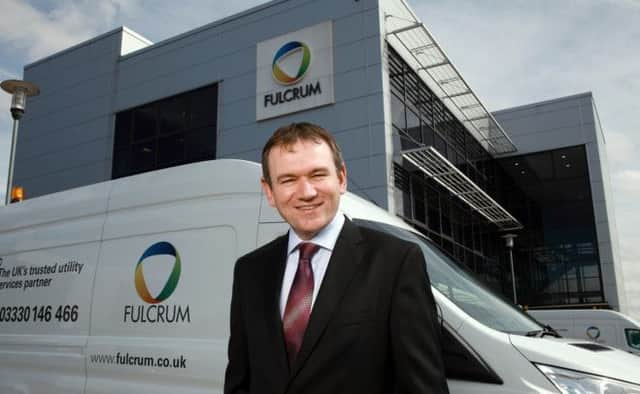Olympic flame still burns for Fulcrum as it moves into profit


LONDON’S Olympic flame could have flickered and died without Fulcrum.
London 2012 was marked by outstanding performances from our region’s athletes, but Yorkshire-based Fulcrum also played a role in the games’ success.
Advertisement
Hide AdAdvertisement
Hide AdThe utility services firm built and managed the system that delivered the gas to the 2012 Olympic flame, as well as the Olympic park and athletes’ village. Fulcrum has hidden its own light under a bushel in recent years, during a period of painful restructuring. But its CEO, Martin Donnachie, believes it’s time for Fulcrum to walk into the spotlight.
The unassuming Mr Donnachie has got reasons to be cheerful. Fulcrum, which is listed on AIM and has received backing from asset manager Marwyn Capital, once languished in a forgotten corner of National Grid. Today, the Sheffield-based business designs and delivers the water, gas and electric pipelines and connections that are vital parts of every construction project.
Mr Donnachie hopes to keep investors happy by focusing on customer service, and Fulcrum’s ability to deliver complex projects. Fulcrum is about to double the size of its workforce, shortly after moving into profit for the first time.
All of the company’s utilities projects across England and Wales will be managed in-house from April 1, after a deal was signed with infrastructure services provider McNicholas. Under the terms of the agreement, staff employed by McNicholas will be transferring to Fulcrum.
Advertisement
Hide AdAdvertisement
Hide AdMr Donnachie believes you’ve got to match great interpersonal skills with a head for figures.
The American entrepreneur Victor Kiam helped to instil this belief in him. While he was president of Oxford University’s industrial society, Mr Donnachie met a host of leading entrepreneurs, including Mr Kiam, who made his fortune from Remington electric razors.
“It was late in his career, but he (Kiam) still had an awful lot of energy,’’ Mr Donnachie recalled. “He listened to what you had to say, and you felt he was with you in the moment. He went through the series of roles that he’d had in his career, and in each one, he’d had ups and downs, but through it all he had displayed sheer drive, and did not allow anything to stand in the way of his success. But he did it with people, and through people. That really shone through.”
Mr Donnachie believes that management must listen to staff at all levels. He put this belief into practice when he held senior roles with big players in the building sector, such as George Wimpey and Rok. You need a head for heights to speak to frontline staff.
Advertisement
Hide AdAdvertisement
Hide Ad“Some of the most engaging conversations I’ve had have been with bricklayers and joiners,’’ he recalled. “In any leadership role people have got to be prepared to do what you ask them to do. If they’re at the top of a six-storey building, you’ve got to be there as well.”
After gaining a mathematics degree from Oxford University, Mr Donnachie qualified as a chartered accountant and went on to hold several senior finance roles. Over the last two decades, he’s managed small businesses as well as £250m turnover national divisions. When he joined Fulcrum in May 2013, initially as its interim CEO, the company had problems. At the time, the board was concerned about Fulcrum’s underlying performance, against the backdrop of a tough construction sector and relatively low demand for utility connections.
“I like a challenge and I could see that Fulcrum had got this great potential, but had lost its way to some extent,’’ said Mr Donnachie. “There was an opportunity to turn it around and make it really successful.”
Although he stresses that the previous management had “done a lot of good things”, Mr Donnachie immediately set to work stabilising the company’s cash position. He also worked on the cost base.
Advertisement
Hide AdAdvertisement
Hide AdIn recent years, the company has been forced to shed staff. Many of these changes occurred before Mr Donnachie arrived. In early 2012, Fulcrum had 240 staff. By late 2014, that number had dropped to 118. Following the agreement with McNicholas, the size of the company’s workforce is about to rise again to more than 230. On Mr Donnachie’s watch, the company recently reported a £329,000 underlying half-year operating profit.
“We need to be a full utilities connections business,’’ Mr Donnachie said. “We can take our customers utilities services issues off them and just deal with them as a ‘job lot’, which is what most of our customers want. Fulcrum put gas on the Olympic flame, which was a phenomenal achievement.
“We’ve also done a lot of work with distilleries in Scotland. We’ve got the ability to scale up into these big projects. We want to be seen as the company that’s the best at handling customers in our industry. If you want to do that, you’re far better taking people at junior level and then training them, and not just in the technical skills they need, but also in the culture you want to create as well.”
He knows what it’s like, from a customers’ perspective, when things go wrong. Without power, painstaking preparations are ruined.
Advertisement
Hide AdAdvertisement
Hide Ad“One of the things I found when I was in housebuilding was that the utility side of things can either help or hinder (a development) to a massive degree,’’ he said. “I know the pain that comes if you can’t deliver a house to the person that’s due to move in, or a hotel that you’ve promised someone for a particular date.
“Utilities are so important in that chain. Our mission in Fulcrum is to make sure that we’re the people you come to if you want that reliability.”
Sentiments the late Mr Kiam would surely have endorsed.